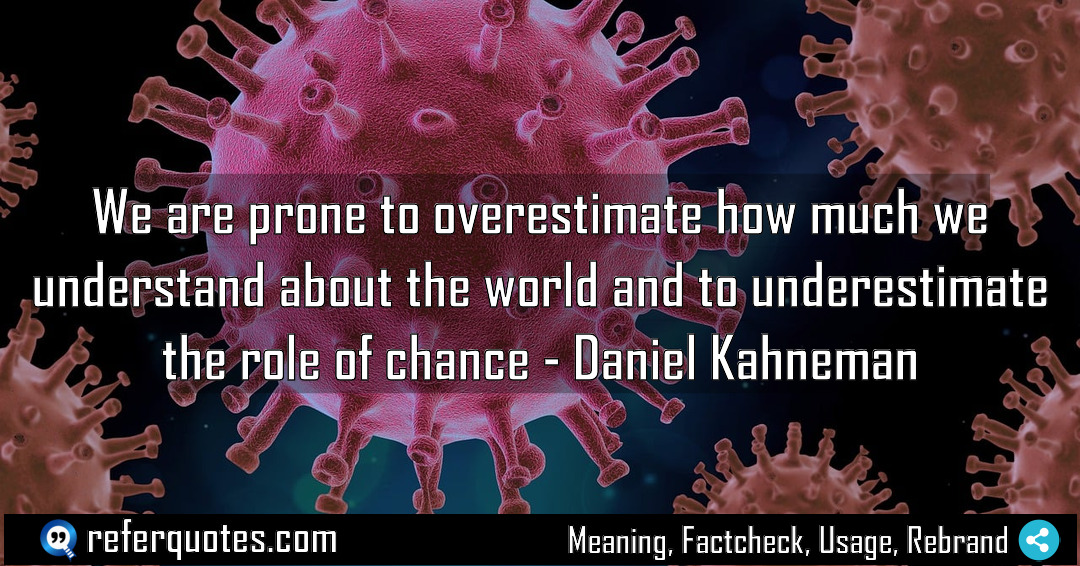We are prone to overestimate how much we understand… and it’s a mental trap that costs us daily. This insight from Daniel Kahneman exposes a fundamental bug in our human software, making us blind to luck and overconfident in our own skill. Once you see this pattern, you can’t unsee it, and it changes how you make every decision.
Share Image Quote:Table of Contents
Meaning
At its core, this quote is about two critical errors: our inflated sense of understanding and our blind spot for randomness. We think we know why things happen, but we’re often just crafting a story after the fact.
Explanation
Okay, so here’s the thing. Our brains are wired for coherence, not accuracy. We have this deep, almost biological need for a story that makes sense. So when an event happens—a startup succeeds, a stock market crashes, a pandemic unfolds—our brain instantly weaves a neat, causal narrative. “They succeeded because of their brilliant, disruptive idea.” We rarely stop to consider the thousand other startups with brilliant ideas that just… got unlucky.
We attribute way too much to skill and planning and far too little to the roll of the dice. It’s why a fund manager who beats the market for two years gets hailed as a genius, when statistically, someone *has* to win by pure chance. We see skill where there’s often just luck. And that overconfidence? It’s dangerous. It leads to bigger risks, failed projects, and an inability to learn from actual mistakes because we’re so busy congratulating ourselves on our supposed brilliance.
Quote Summary
| Context | Attributes |
|---|---|
| Original Language | English (3668) |
| Category | Education (260) |
| Topics | bias (25), chance (2), uncertainty (21) |
| Literary Style | analytical (121) |
| Overall Quote Score | 78 (178) |
Origin & Factcheck
This is a direct quote from Nobel laureate Daniel Kahneman’s seminal 2011 book, Thinking, Fast and Slow. It’s a cornerstone of his life’s work on behavioral economics and cognitive biases. You won’t find him saying this in an earlier lecture or paper in this exact phrasing; this is the polished, powerful version that anchors a key concept in the book.
Attribution Summary
| Context | Attributes |
|---|---|
| Author | Daniel Kahneman (54) |
| Source Type | Book (4032) |
| Source/Book Name | Thinking, Fast and Slow (54) |
| Origin Timeperiod | 21st Century (1892) |
| Original Language | English (3668) |
| Authenticity | Verified (4032) |
Author Bio
Dr Daniel Kahneman transformed how we think about thinking. Trained in Israel and at UC Berkeley, he built a career spanning Hebrew University, UBC, UC Berkeley, and Princeton. His partnership with Amos Tversky produced prospect theory and the heuristics-and-biases program, culminating in the Nobel Prize in Economic Sciences. He engaged broad audiences through bestselling books and practical frameworks for better decisions. He continued writing and advising late into life, leaving ideas that shape economics, policy, medicine, and management. If you want to dive deeper, start with the Dr Daniel Kahneman book list and explore his enduring insights.
| Official Website
Where is this quotation located?
| Quotation | We are prone to overestimate how much we understand about the world and to underestimate the role of chance |
| Book Details | Publication Year: 2011; ISBN: 9780374275631; Latest Edition: Farrar, Straus and Giroux, 2013; Number of pages: 499. |
| Where is it? | Part III: Overconfidence, Chapter 21: The Illusion of Validity, Approximate page 207 (2013 edition) |
